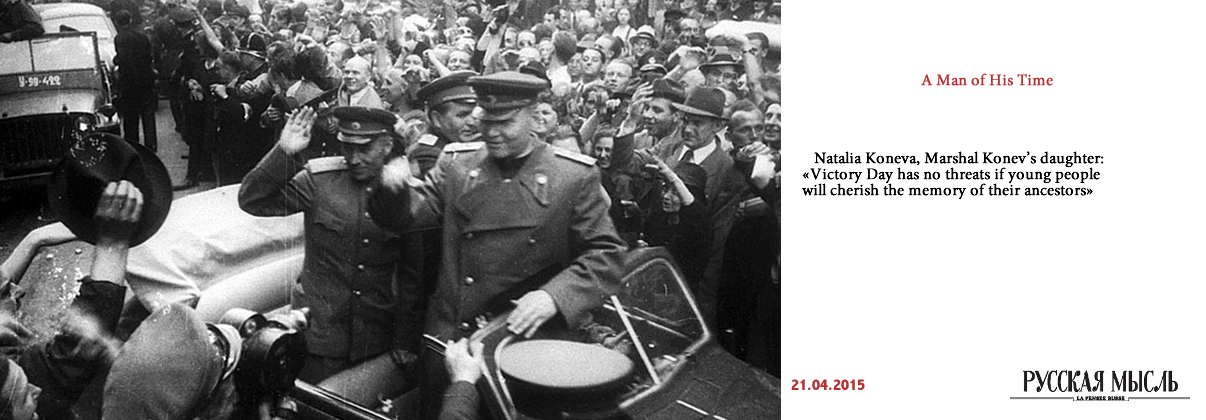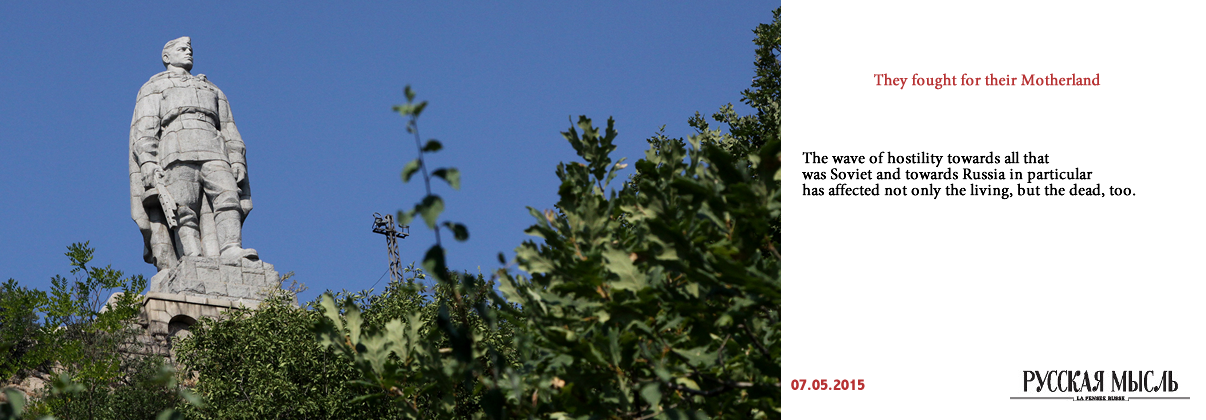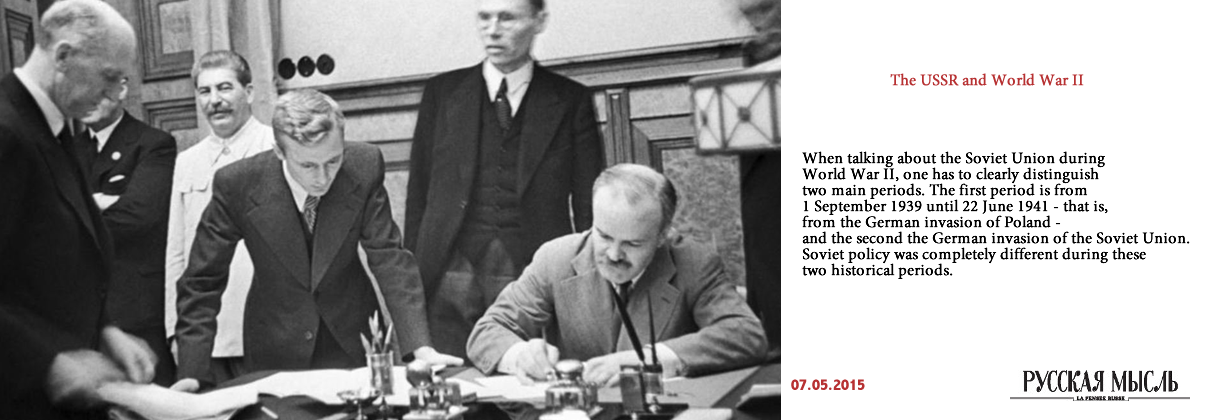Author: Olga Privalova
Natalia Koneva, Marshal Konev’s daughter: «Victory Day has no threats if young people will cherish the memory of their ancestors»
The name of Ivan Konev, Marshal of the Soviet Union, Twice Hero of the Soviet Union, unites many events of World War II – the battle for Moscow, battles at Kursk and in Ukraine, the liberation of Belgorod, Prague and Krakow, the liberation of Auschwitz concentration camps, and the capture of Berlin.
We talked about the 70th anniversary of the Victory, the importance of being involved in its commemoration and the fate of the holiday with professor of the Military University and the Chairperson of Victory Marshals Memorial Fund, Natalia Koneva, daughter of Marshal Konev.
– Natalia, on the eve of May 9 you have a busy schedule. It is always much more interesting to obtain information from witnesses instead of textbooks, isn’t it?
– Of course. History always has many details. My father took part in the liberation of the Polish territories, and not only the ancient cities with a glorious history, such as Krakow. He liberated the greatest relic, the icon of the Mother of God, which is now in the city of Czestochowa and is revered by both Catholics and Orthodox. According to the legend, the icon belonged to St. Luke who painted it on the board of a table at which the holy family used to gather. Somehow, the icon was found in Russia and then returned to Poland. Czestochowa was liberated, and it is said that local people were terribly grateful to the Red Army.
This year, the World Jewish Congress invited me to participate in the commemoration of the 70th anniversary of the liberation of Auschwitz. It was a great event; there were victims and their families, and a few former juvenile prisoners from Russia.
There was also an official delegation from Russia but the Europeans did not acknowledge it in any way. Instead, Poroshenko got a lot of attention, as well as German President Gauck.
The Death Gate, through which the prisoners were taken, to be then sent either to the gas chamber or to labour camps, produced an incredibly strong impression; this light, this snow, and this road without return along which the people were transported. When darkness fell the official delegations went there to light candles and lay wreaths.
– At these events are you a representative of the Fund or rather a private person?
– I visited Auschwitz as my father’s daughter. It was very interesting to hear the testimonies of victims and witnesses; a person who had been there would never be able to say that the Holocaust never happened. The atmosphere is terrifying, and everything was permeated with this feeling of resentment. We felt united. The President of the World Jewish Congress, Ronald Lauder addressed us with an incredibly interesting speech. He said that it is not enough to observe events, we should all be involved, he repeated. If you do not agree, express it. I think this position is very topical today. A person cannot just watch evil things happen and consider them none of their business.
– How does the Fund work?
– The Fund unites the direct descendants of World War II army commanders. We joined our efforts almost 13 years ago, motivated by a lot of publications, which stated that the soldiers were real heroes, while the military leaders had their hands stained with blood and did nothing for the victory. We just could not accept it and decided to tell the truth.
We published a big calendar called “Victory Commanders”, featuring 10 people who were awarded the Order of Victory. The Supreme Commander was the eleventh. We included their photos, not those hanging in galleries and deprived of any individuality, but family pictures. The book “The Names of Victory” with each chapter devoted to a Red Army commander was also compiled by the descendants. It contains the memories of their loved ones, excerpts from documents, and exclusive photos. In the new edition, we have included the information about those unfairly seldom remembered. For example, there was General M.S. Shumilov, commander of the 7th Guards Army, a forceful and strong-willed commander. He fought in Spain; Konstantin Simonov’s poem “Spinning a Spanish Record” is about him. He fought at Stalingrad, and then on the Dnieper River in my father’s army. He fought well, and his army was among the first to cross the Dnieper. And this is only one case among many similar others. We hope that the book will be released on May 9th and will become another of the Fund’s book of which we are very proud.
– Does the state help you somehow?
It helped us with our previous book dedicated to the 65th Anniversary of the Victory. We addressed the Presidential Administration, and they helped us to publish it. Any book requires investment, which we derive from sponsorship donations. But we are a public charity organization, we do not collect any money to fund our activities, we do not even have a bank account. We do not expect any earnings, our reward is of a moral kind.
We also organize exhibitions. The idea was to target the generation of the early 20th century; in fact, many commanders survived the First World War, beginning their service as privates and non-commissioned officers of the Imperial Army.
On May 9th, we, the children and grandchildren of commanders, will lay flowers at the tomb of the Unknown Soldier. Then we will go to the graves of our parents, many of whom are buried in the Red Square. On the day the war began, June 22th, we will go to the Novodevichye Cemetery and lay flowers on the graves of those who have been in our organization, and those who have no descendants – alas, they are a lot.
– Your father started his career by swearing allegiance to the Emperor and finally became a USSR Marshal.
– My father was a non-commissioned officer in the Imperial Army. I read his memoirs, but unfortunately he wrote very little about that time. It was 1916, and he was born in 1897. In the army the commanders noted my father’s analytical mind, and he was sent to study in the non-commissioned officers’ institute, where he distinguished himself. He had been assigned to artillery reconnaissance.
When their heavy artillery was sent to the West, they arrived in Ukraine, but the train didn’t make it to the front. The soldiers were disarmed and sent back to Russia. Many of them have read the Bolshevik newspapers describing the terrible Tsar and Tsarina, as well as Rasputin who did whatever he wanted. It was a powerful propaganda. After the February Revolution my father came to Moscow, where he wore a red bow and disarmed gendarmes. This was his first revolutionary baptism. The choice had been made; his position was clear – getting rid of the king, who disrupted the Army and did not know how to fight.
When the Revolution broke out, he returned to his native Nikolsk. But instead of a civil war the town was threatened by intervention through the Northern territories. People had to mobilize to avoid losing their land, and my father still being a boy created his own combat revolutionary unit. The Revolutionary romance was incredibly fascinating.
Later on, he organized a Bolshevik unit; they went to the 5th All-Russian Congress of Soviets, where Lenin spoke. He listened to Lenin and to Maria Spiridonova, captivated by her oratorical skills. He felt the truth in revolutionary slogans. He later said that, “we have been infected with the ideas of the Revolution”.
The civil war divided families, and my father’s family was no exception. One of his brothers, uncle Grisha, was the full Cavalier of the St. George Cross, and his second brother was a village constable. And he thrashed my father for reading the wrong books. The civil war does not know the truth about the execution of White Army officers. The White Terror coexisted along with the Red Terror, and my father experienced first-hand the cruelty of the war. Fortunately, in the 1920s he was in the Far East, where the fight with the Japanese wanting to recapture this territory had already begun.
Commanders saw that my father had the necessary nerve, character, intellect, and charisma, so they sent him to the Red Army higher officer training centre. The best military experts (“white” officers) were also there: former General Staff member Karevsky, former Minister of the Kerensky Cabinet Verkhovsky, former academy teacher Lignau, a German by origin. My father read all the works of Bismarck and Moltke. I still have his notes about tactics, strategies, and quotes by Henry Ford written in pencil. He treated knowledge in a unique way. He wrote, “I studied with passion”, so strong was the desire of a provincial boy to achieve a prominent position! He showed the same passion during his studies at the Academy, where the future military elite studied on the eve of the war. A former colonel of the Imperial Army Shaposhnikov was the Head of the Academy, he was also one of the first Soviet Union Marshals that Tukhachevsky taught before he was executed. And Uborevich.
– Was Ivan Konev loyal to the party?
– He was a man of his time. Did he understand the situation? He absolutely did. Did he see the drawbacks that we have already been told about? Of course, he did. Moreover, he was a very attentive reader. Whenever he picked up a newspaper, he managed to see the details, for which my eye was blind. He knew and analyzed a lot, and he also understood a lot. Did he understand all the depth? I was too young to delve into it, but he actively argued with my sister. My sister was born in 1923. She had her own point of view and rather belonged to the intelligentsia, sharing dissident views. She even communicated with a woman who came to Red Square to protest against the Soviet invasion of Prague. My sister worked in the Foreign Literature Publishing House where many talented poets and writers came. She represented the other side of our lives and was inclined to criticize our reality. She often did that with sophisticated words while discussing the problem of camps, and the problem of Solzhenitsyn, whose works were just published. She brought home the books published abroad. Thus, I read “The Murder of the Royal Family” by N. Sokolov while still a schoolgirl. This is my sister’s great merit; back then she showed me many phenomena, of which we know today. And I am grateful to my father for not constraining me, by approving of my studies. I was free to choose a profession, even though he wanted me to become a doctor. I strongly objected because I didn’t like medicine generally, but, ironically, I am married to a doctor. We have lived together for forty years.
His dismissal was a hard hit, he felt it was impossible for him to do nothing and thus he fell ill. He kept hiding his illness from others. He was well-organized and he always looked smart.
In general, the concept of work for my father has always been very important . One of his most terrible curse words was lordliness. He meant it not as an offence for one’s origin but for the inability to work. By the way, my brother was married to a girl who came from a very high-born family (Princess Chagadaeva), and of course, my father knew that her father was executed as an enemy of the people. Notwithstanding this, he treated her with great respect and was proud of her, as she worked hard to become an Honored Artist of Russia. Then, as fate would have it, she became the wife of Igor Moiseyev, the head of the ensemble. We are still on friendly terms.
– Did you have some internal protest as a teenager, thinking that you are the Marshal’s daughter, allowed to do anything?
– On the contrary, I had a strong desire to hide. Now I meet with journalists, because it seems that I have something to say and something to share. But back then, being a child, I was very upset if father decided to drive me to school. I said, “Dad, please, just stop a little farther from school. I don’t want my classmates see me get out of this black car”. In those days, Chaika, and especially ZIS cars were rare.
– Did the teachers highlight the fact that you were the Marshal’s daughter?
– This was not typical of the school where I studied. You may not believe me, but over the 10 years of my studies my father never came to my school. Moreover, I was happy that he never came. Publicity can be fun if you choose it yourself, but it is awful when you are made public against your wishes.
– Now, when history is rewritten, when facts are changed, and the participants of those events pass away, what do you think will be the fate of the May 9th holiday?
The date will probably remain. There still are many memorable dates belonging to the events long gone. Of course, there will be no such interest provoked by veterans of the army who are still alive, all adorned with awards. But I can see how young people treat this holiday, I see a wonderful, sincere attitude.
Now we hear the word “war” almost every day from TV, and the “information war” is the usual reality of our lives. We may not realize that peace celebrates its 70th anniversary and May 9th is a great worldwide event. It seems to me, its memory is transmitted by the family and upbringing rather than by stones or monuments. Victory Day is safe if young people will keep the memory of their ancestors, but if they throw the pictures of their great-grandfathers and great-grandmothers away, this will be awful.
We have to shoot good movies. The movies for the masses should attract the younger generation and tell them that they live in a country that could achieve victory. Probably, the whole world will soon will think that the Americans defeated the Russians in World War II. But our country should also take some part of the blame for this. We just kept silent for a long time. Any war has victims and victories, but it also offers a clearer event overview. When you come to Auschwitz, you understand what it is and you need no explanations. There’s no necessity to show the atrocities of fascism in a naturalistic way, but we need to show and say that this is evil.
The war has consequences: the values of the weaker and defeated nation suffer an absolutely immoral use. And if my father organized the rescue of the Dresden Gallery paintings, then why does nobody speak about it? After all, he wasn’t obliged to, what for? War pays all scores. In the end, we did not find the Amber Room. We drove out the Nazis and liberated people in concentration camps, but we also saved values and culture – libraries, engravings and paintings, which we returned to Dresden in 1955. This is very important.
It is necessary to show humanity – we provided supplies to the populations of towns and cities liberated from the Fascists; we shared our rations with the children of ruined Berlin, despite the fact that Germans fought to the bitter end. Little boys and old men were not going to surrender.
So, if the monument of a soldier with a girl in Treptow Park is truth, why shouldn’t we tell that truth?




